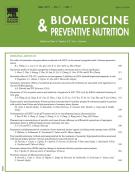Induction of renal damage and modulation of redox potential in rats infused with glyoxal - 06/06/12
Abstract |
Oxidative stress and protein modifications are frequently observed in numerous disease states. The reactive intermediates of protein glycations accelerate the formation of advanced glycation end-products (AGEs), which plays a critical role in diabetic nephropathy. Glyoxal, a reactive ⍺-oxoaldehyde, which is a physiological metabolite formed by lipid peroxidation, ascorbate autoxidation, oxidative degradation of glucose and degradation of glycated proteins. Experimental evidences have shown that glyoxal accelerates the rate of glycation process leading to the formation of AGEs and is capable of inducing cellular damage. However, the direct role of glyoxal in the kidney tissues of rats has not been precisely defined. Hence, the present study was reamed to evaluate the toxic role of glyoxal on the induction of renal damage. Wistar male rats weighing 100–150g was infused with glyoxal (0.4%/kg b.wt/day) for 3 weeks. On infusion of glyoxal, animals exhibited a significant (P<0.01) increase in the level of lipid peroxides (LPO) with declined activities (P<0.01) of antioxidant enzymes such as superoxide dismutase (SOD), catalase (CAT), and glutathione (GSH) content. In addition, glyoxal infused animals demonstrated a significant collagen accumulation along with evidenced gelatinases activity. Moreover, the immunohistochemical analysis of MMP-2 and -9 in the kidney tissues correlates with the activity studies. Also, the expression of receptor for advanced glycation end products (RAGE), TGF-β and p38 MAPk evidenced the involvement of MAPk in the development of kidney damage on glyoxal infusion. Thus in the present study, we show a novel data to speculate that glyoxal promotes kidney damage through oxidative stress mediated expression of RAGE and altered ECM synthesis.
Le texte complet de cet article est disponible en PDF.Keywords : Glyoxal, RAGE, ECM, Antioxidant enzymes, RAGE, ROS
Plan
Vol 2 - N° 2
P. 119-124 - avril 2012 Retour au numéroBienvenue sur EM-consulte, la référence des professionnels de santé.
L’accès au texte intégral de cet article nécessite un abonnement.
Déjà abonné à cette revue ?


